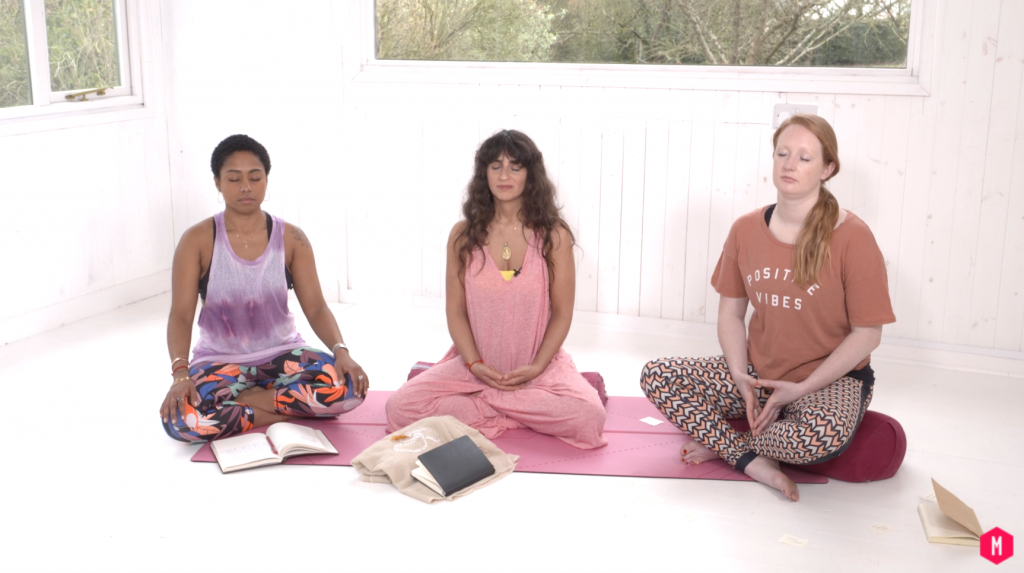
We often think of the body and mind as separate but yoga helps us to experience the close connection between the two. Kat and Rakhee’s tips on how yoga helps mental health encourage us to show kindness to our bodies during Mental Health Week. #BeBodyKind 13-19 May and then make it a habit.
Yoga helps mental health. It really does! I really value the sensation of personal freedom and spaciousness that I feel after practicing yoga. My cells somehow seem larger, bursting with energy and more vibrant. I feel a spaciousness in my joints. There seems to be space in-between the vertebrae where the bones used to be crunched up and hunched over. My body feels free to move, to take up space, to breathe deeply. And that very visceral, physical feeling of freedom changes how I think. I feel free and for me that means mentally healthy.
My worries seem to slip away. I’m able to get into the ‘zone’. I feel less anxious about big decisions and focus on making better decisions. I feel happier, wiser, saner.
The Game Changer
Physical movement of any kind makes us feel great. On one level, yoga is just a very effective way of making the body move in every different direction, strengthening and lengthening all at once. The joy of moving is one thing but when combined with very deep, conscious breathing, it’s a complete game-changer! Yoga is a work-in challenging the mind and body in ways that no other ‘fitness’ regime can touch. It allows us to get fit in body and mind. The breath, allows us to feel what we are feeling and to pause before we react.
Scientific research backs up my personal recommendation and your personal experience. Here are five ways in which yoga can help your mental health.
1. Yoga Makes You Happier
In 2005, German researchers asked a group of ‘emotionally distressed’ women to undertake three hours of yoga a week for three months. Researchers saw a 50% improvement in depression, 30% in anxiety and 65% improvement in overall wellbeing.
The therapeutic effects of yoga have also been proven with psychiatric patients, sufferers of post-traumatic stress disorder, and women experiencing the menopause or postmenopausal symptoms.
Emotional well-being is, of course, of utmost importance to our physical and mental health.
In another study, measures of positive and negative affect, mindfulness, perceived stress, and arousal states were taken in 24 people with an existing weekly yoga practice. Some of whom maintained their weekly practice whilst others started a five-times-per-week practice across a fortnight.
The morning daily practice group (five times weekly) showed significant beneficial changes in each of the measures including an increased ability to cope with stress. These findings, thus highlight the benefits of a daily yoga practice and might also prompt us to roll out our mats a little more regularly.
2. Yoga Helps You Sleep Better
Sleep is key to maintaining good mental health and affects our ability to use language effectively, our focus, our understanding and our hearing. It is the quality and not quantity of our sleep that matter and it’s a fact, yoga can help. Even if you don’t really have a sleep ‘problem’, the deep breathing, physical exercise and mindfulness associated with a yoga practice help calm the nervous system and improve your zzzzs. If you need help getting to sleep, you’ll find lots of inspiration in our Ready For Bed selection .
3. Yoga Helps Reduce Stress
Research makes a link between yoga and the modulation of stress response systems such as a raised heart rate, high blood pressure and shallow breathing.
Everything about yoga, from the slow, steady breathing to the inversions, can help lower the amount of cortisol in your brain. Cortisol is the hormone that appears when you’re stressed; activating the brain amygdala, also known as the fear centre. Regular practice of yoga can cause cortisol levels to drop. As well as dropping cortisol levels, the practice of yoga can increase and decrease areas of the brain and releases beneficial chemicals. One of these areas is the hippocampus, which helps us to deal with stress and anxiety. The hippocampus in yogis increases compared to other groups in the study.
Boston University studied 34 individuals over 12-weeks, half of which spent one hour three times a week walking, while the other did yoga for the same amount of time. The researchers monitored levels of the chemical associated with decreasing anxiety and improving moods, known as gamma-aminobutyric acid (GABA). The level of GABA rose in the yogis by 27 percent. The walkers’ results were much less significant. Also, dopamine and serotonin, chemicals that help us feel more relaxed and ready to handle stressful situations, rose significantly. No wonder yoga has a reputation for giving you a natural high.
4. Beyond Physical Exercise
Do you feel focussed after Yoga? This is because yoga helps increase the size of certain parts of your brain, such as the superior parietal cortex, which helps you concentrate your attention on specific things! This is great news for us multi-taskers who always have a million things to do and projects on the go.
The evidence suggests that yoga interventions appear to be equal to and/or superior to exercise in most outcome measures for people with various health conditions. This is because of the emphasis on breath regulation, mindfulness during practice, and the importance given to maintenance of postures. These key elements are those that most differentiate yoga practices from physical exercises.
5. #BeBodyKind
Almost 1 in 3 adults feel so stressed by issues relating to their body image or appearance that they feel overwhelmed or unable to cope. Low body esteem can result in isolation and pressure to meet other people’s ideals. Truthfully, how do you think and feel about your body? Yoga is massively helpful in thinking about our bodies in more positive ways and with kindness.
Yoga allows us to accept ourselves for who we are. By becoming more present we allow a more compassionate response to our bodies and our perceived limitations. Besides which, yoga also helps us to build a greater understanding about developing our strength physically and mentally. As we do so we can begin to loosen our grip on unrealistic ideals and appreciate our bodies. Research has shown that the more comfortable we are in our own skin, the greater our general well-being with the result that we are less likely to indulge in destructive behaviour.
The theme for Mental Health Awareness week is Body Image which invites us to explore how we think and feel about our bodies. We invite you to explore this through yoga and let us know how yoga helps mental health.
>>Try this class to explore self-acceptance and self-love<<

________________________________________________________________________________________________________________


This post was written by Movement for Modern Life’s founder, Kat Farrants with input from MFML’s wordsmith maven Rakhee Jasani





Thanks for the article, I shared it with my partner who is stressed and anxious currently. He used to participate in Hot Yoga but gave up due to work commitments. He used to enjoy it and I am trying to encourage him to take it up again.